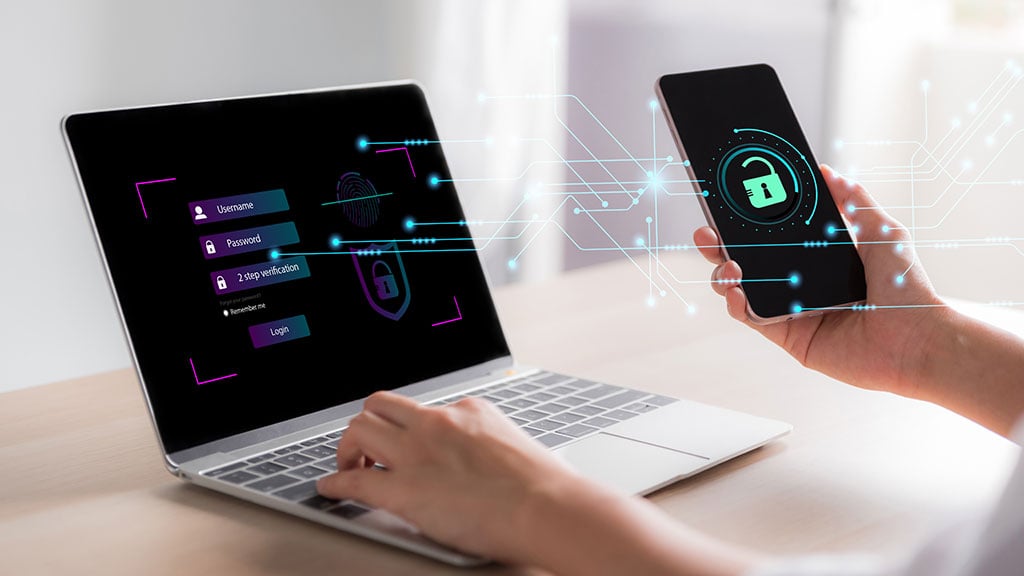With an increase in cybercrime incidents, you need to know how to protect your data
Cybercrime is becoming increasingly common, and recent data breaches have affected millions of Australians, including some Deakin students.
Many current and former customers of companies like Optus and Medibank have been left vulnerable, with their personal information accessed by hackers and used for identity theft and other malicious purposes.
With the estimated cost of cybercrime to the Australian economy in 2021 reaching $42 billion, it’s never been more important to protect your personal online information. Here’s some things you can do.
Set secure passphrases
Creating long, unpredictable and unique passphrases – a password composed of a sentence or combination of words – helps to secure your accounts from criminals. You should also avoid reusing the same password for multiple accounts, as this can make you especially vulnerable to hackers accessing your online information.
Using a password manager will allow you to store and secure all your passwords. Luckily, all Deakin students have free access to LastPass – a secure password manager that helps you generate and store passwords, and sync data across all your browsers and devices. Basically, it remembers your passwords so you don’t have to!
Instructions for changing your Deakin password can be found in Username and Password support.
Update your devices
Turn on automatic updates on all your devices to enable regular security upgrades. These integrated updates resolve any identified weaknesses in apps or systems that make them vulnerable, making it harder for cybercriminals to access your data.
Activate multi-factor authentication
Multi-factor authentication (MFA) is the most important defence against cyber criminals. Using an extra layer of security in addition to a username and password helps to protect your accounts.
All Deakin student accounts must have MFA applied to them within 30 days of activation. With MFA, you verify your identity via the DUO mobile app when you log in to Deakin applications.
You should also use MFA on your other accounts where possible.
Back up your devices
It’s important to store a digital copy of the information stored on your device. This allows you to restore your files in situations where your device experiences hardware failures, breakage, theft or loss. Information such as documents and files from applications can be saved to external storage devices or the cloud.
Watch out for scams
Cybercriminals use emails, phone calls and social media to lure you into exposing sensitive information, transferring money, opening an attachment or visiting a malicious website. These scams can impersonate trustworthy sources and are made to appear as if they were sent from legitimate organisations or individuals.
It’s important to be able to identify these scams to avoid falling victim to them. Beware of any email you receive that:
- has an unrecognisable or odd-looking ‘from’ address
- contains poor spelling or bad grammar
- is awkwardly worded or nonsensical
- promises large sums of money or other unbelievable offers
- uses aggressive language
- contains a sense of urgency
- asks you to click a link
- contains an unexpected attachment or request for money.
Please immediately report any suspicious emails to Deakin’s cybersecurity team via the ‘Phish Alert’ toolbar in your Outlook window. If you’re not using Outlook, forward the email to [email protected].
There are no consequences for reporting a legitimate email, so remember that it’s better to be safe than sorry. And don’t be embarrassed to report any suspicious activity – your experience may help prevent another student from being scammed.
Where to get help and more information
- If you’ve clicked a suspicious link and sent money, shared your banking details or are worried that your banking details may have been breached, contact your financial institution immediately.
- Our Cyber Security blog will keep you up to date with the latest known online scams and show you how to stay safe online.
- The Australian Cyber Security Centre has lots of helpful information about how to protect yourself online and what to do if you’re hacked.
- Got a question or IT issue? Contact IT Help.
